#herland
Text
Charlotte Perkins Gilman in 1915, imagining a society without men: The clothes will be comfortable, and by golly, there will be pockets!


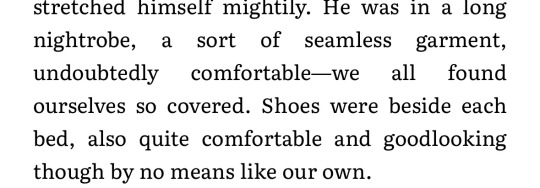



5 notes
·
View notes
Note
What book are you currently reading? How are you liking it? What book are you going to read next?
I’m currently reading ten (10!!!) books at once! Most recently picked up is The Third Daughter by Adrienne Tooley. I’m about a quarter of the way through, and it’s pretty good - I’d give it a solid 7/10. I like the worldbuilding and the plot so far. Started reading it based off a three-word review I saw an internet stranger give it - ‘magical furious lesbians’ and it really lives up to it ❤️
The other nine books I’m reading are:
Crimson Rivers by bizarrestars (a Hunger Games Jegulus AU fic but it’s so long I’m counting it as a book)
The Magician’s Nephew by C. S. Lewis (not really liking it tbh, the writing style just isn't engaging)
Herland by Charlotte Perkins Gilman (I’m only at the start but I have to say, an all-female utopia is a pretty good story as far as I’m concerned)
The Thursday Murder Club by Richard Osman (not as good as people build it up to be but still pretty decent)
The Paris Bookseller by Kerri Maher (Parisian lesbians with bookshops and a lot of wine? Yes please)
The Witches of Vardø by Anya Bergman (it seems good? I'm only at the start, but I'm loving the worldbuilding)
The Clockill and the Thief by Gareth Ward (a YA novel I picked up a few years ago and loved. It's the second book in a steampunk duology set in Victorian England (AU) and I'm rereading it to heal my inner child)
Pride and Prejudice by Jane Austen (needs no introduction - swoon)
Sorry for the disgusting amount of time it took for me to respond to this ask - I started typing this response ages ago, chucked it into my drafts folder, and forgot all about it.
What are you reading right now @nerdy-girl3791? How do you feel about it? What are you going to read next?
#bee answers#bee rambles#what else is new#crimson rivers#bizarrestars#the magician's nephew#c.s. lewis#herland#charlotte perkins gilman#the thursday murder club#richard osman#i really like his comedy as well#any britcom fans hanging around the edges of The Pit?#jump on in#we're all mad here#the paris bookseller#kerri maher#the witches of vardø#anya bergman#the clockill and the thief#the traitor and the thief#the traitor and the thief duology#gareth ward#pride and prejudice#jane austen#if you read this far down the tags....congratulations you nosy bastard#(the previous tag is spoken in a low and sultry tone as i lean forward to kiss the tip of your nose)#boop!
6 notes
·
View notes
Text
Charlotte Perkins Gilman was saying in 1915 what people today just absolutely refuse to believe
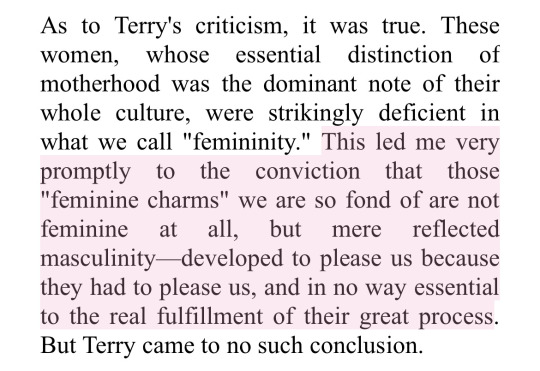
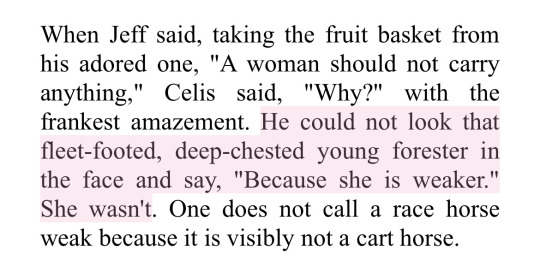
28 notes
·
View notes
Text
Charlotte Perkins Gilman creating an all woman utopia: They had pockets. So many pockets. No seriously you don't understand, let me tell you again. Pockets.
17 notes
·
View notes
Text
Book 33, 2023
Everyone loves "The Yellow Wallpaper", the semi-autobiographical gothic horror story about postpartum mental health issues and the treatment of women's illness in the late 19th and early 20th century.
We regret to inform you that the author of "The Yellow Wallpaper", a white feminist born in 1860, has horrible politics. Who could have foreseen this?
The answer is: anyone if we studied literature in the context of an author's wider body of work, instead of cherry picking and whittling down an author profile for specific relevance to that chosen work. I studied "The Yellow Wallpaper" in multiple university classes, because it is an excellent little story, heavy with symbolism and material to interpret, while also having a very clear message. It's unsettling, raw, claustrophobic, bumping against issues that we're still grappling with over a hundred years later. There's a reason Charlotte Perkins Gilman is primarily remembered for this story, which doesn't reveal any of her more questionable opinions. So periodically people on social media get to discover things like how she was an eugenicist.
I wrote a number of papers on depictions of single-sex societies in fiction while at school, which means I also read Gilman's novella, "Herland", which gives room for her wider politics to breathe, but I was still surprised by what I found in her fiction reading "Herland and Selected Stories".
For starters: a lot of them are fairly unimpressive and mundane and I wasn't reading a collection of all of Gilman's fiction. These were curated by an editor. I admit to not having read Barbara H. Solomon's introduction; I skimmed it and didn't see any references to Gilman's opinions that are less palpable to modern readers. Perhaps there she explains her logic for the stories she selected.
Some of the stories concern utopia-adjacent feminist ideals relevant to Gilman's time. Older women finding themselves invigorated by late-in-life discovery of things that fulfill them outside the confines of the wife-and-mother role. Young women guided to more fulfilling lives independent of men they don't really want by older mentors. Women finding common ground in being hurt by the same man and uniting with each other, instead of embracing a villain in the Other Woman. Women finding love but with men who respect them and don't ask them to change themselves. Which is all fine and can be recognized as progressive and counter to the culture of the time.
They're not very interesting, though, Gilman's polemic against the patriarchy more significant than any interesting plot or character sketch or artistically pleasing turns of phrase.
The selected stories don't particularly advertise Gilman's racial stances. Gilman was a great-niece of Harriet Beecher Stowe and, while she acknowledged the ill that had been done to Black Americans, similarly fails to understand the wider systemic problems of post-slavery America and her own contributions in perpetuating a culture of white supremacy. There are a few references to "coloured" maids, most egregious in "Her Housekeeper", where a Black maid is present and named and the reader is informed she sleeps on the couch, but doesn't care where she sleeps, if she even needs to sleep. Unsurprisingly, what's most conspicuous is the otherwise complete absence of Black people from any of the selected stories.
The matter of eugenics is more clearly on display, thought, particularly in "Herland", where good women and citizens who are "inferior" recognize themselves as such and choose to forego motherhood (the female ideal in their society and for the women in many of the selected short stories, despite Gilman's beliefs being counter to strict gender roles), preventing the spread of those "inferior" qualities (physical and mental disabilities and asocial tendencies that could lead to crime). The women are all fit and diversely Aryan (blonde, brunette, redheaded, pale, tan). Other stories remind us that fat women are repulsive to witness in society.
The story that really captured my attention was "When I Was A Witch", in which a woman acquires ambiguous magical abilities that she uses to angrily right societal wrongs, only to lose them when she tries to impose something positive and pure in the form of making all women realize all the good power and potential available to them as women, drawing a line between women as they exist and "real" women, who have embraced "... their real power, their real dignity, their real responsibility in the world ...", who don't behave in a way the narrator finds embarrassing. This is labeled white magic versus her previous black magics that come from rage. But it's undeniable that those black magic wishes represent real beliefs of Gilman's, many of them coming from a place of good intentions. Carriage drivers are made to feel the physical suffering their horses endure, reducing their cruelty to the animals. Shareholders of major companies are made to feel the suffering the people at the bottom of the chain of power, pushing them to change their priorities from profits to people. Domestic animals in the city lead lives either stifled or full of suffering, so they all suddenly die. Parrots are given the ability to speak their 'opinions' of their owners and they all hate them.
Also, they think their predominantly female owners are ugly.
Gilman would love PETA.
There's a condescending feminist version of noblesse oblige in how Gilman and her protagonists talk about other women who have not found or chosen the path of what Gilman sees as empowered, fully realized femaleness that leaves a bad taste in my mind. Women need to work together to uplift each other and rely on each other in their stories, but they need to recognize that some women are going to try and keep them from fulfilling themselves because they don't Understand and have become disconnected from True Femaleness in a very second-wave eco-feminist nature mother way.
"The Yellow Wallpaper" is clearly Gilman's most enduring work of fiction because, in addition to being an easy work to teach, it's genuinely good and coming from a real, personal place. It doesn't propose a solution to the protagonist's distress, it has an ending that breaks her instead of giving her a neatly gift-wrapped solution because there isn't an easy solution for post-partum depression. When she moves away from that personal experience in her fiction, the reader also moves away from connecting with it. The politics, both good and bad, don't intersect meaningfully with the personal, and a number of them simply aren't good.
Sometimes it's easy to forget an author might only have one good one in them.
5 notes
·
View notes
Photo

Blue Books for Monday! Part 1 of 2 :)
Inspired by @godzilla-reads
#Here are some blue books I own#I've read half of these#blue books#monday#blue#books#mychatter#wuthering heights#emily bronte#ramona blue#julie murphy#princess jellyfish#scott pilgrim#the 2000s made me gay#grace perry#hamnet#maggie o farell#marbles mania depression Michelangelo and me#ellen forney#herland#charlotte perkins gilman#the will to change men masculinity and love#bell hooks#the girls#emma cline#women in their beds#gina berrault#lori gottlieb#maybe you should talk to someone
37 notes
·
View notes
Text
reading charlotte perkins gilman is crazy because at first it's aww the yellow wallpaper cute feminist gothic horror okay nice. and then you read Herland and it's... eugenics!!!!
#charlotte perkins gilman#the yellow wallpaper#herland#gothic literature#gothic lit#gothic horror#like okay girl why dont we calm down i feel like we lost the plot
1 note
·
View note
Text
finished herland… i understand the importance of this story, and it has some great ideas/concepts, but it’s severely outdated. i need to collect my thoughts to write a full review but i think it’s a 2.5! wish i had the physical (instead of the audiobook) so i could underline some quotes
0 notes
Text
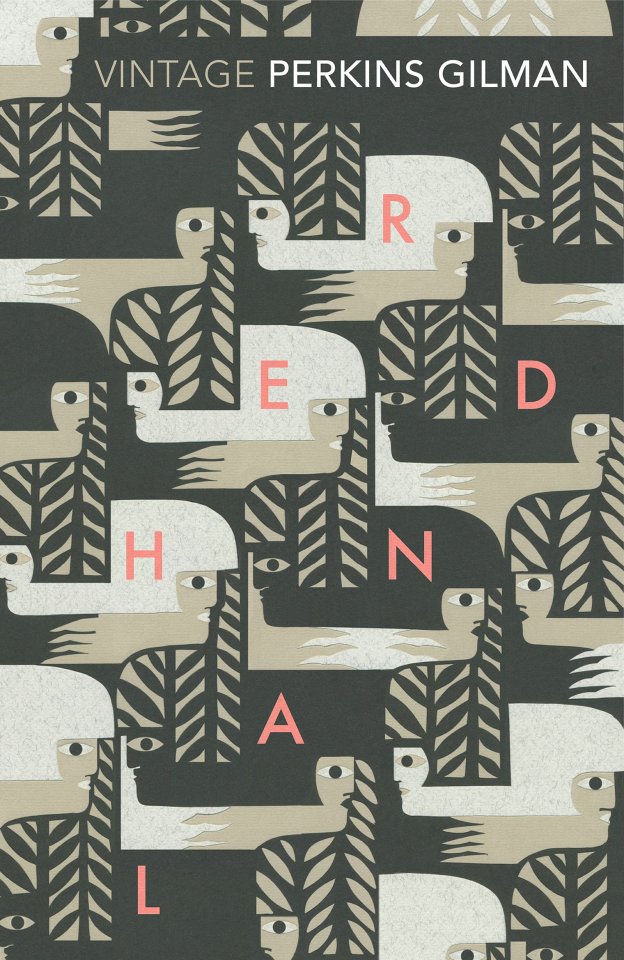
Title: Herland | Author: Charlotte Perkins Gilman | Publisher: Vintage (2017)
0 notes
Text


oil painting by Lacey Bryant, 2023
From the artist: "I was invited to make a painting for the upcoming show FEMM (Feminine Expression Minus Misogyny) at Empire Seven Studios. At the time, I was reading some very funny early feminist utopian literature (yes, full of so many flaws, but it was a product of its time and limited in its worldview), so I decided to illustrate the three main characters from the serialized novel Herland written by Charlotte Perkins Gilman in 1913. Herland being an imaginary isolated society of ladies who reproduce by parthenogenesis and have had several thousand years to live in a world where they are fully people, second to no other gender. It was a thought experiment during a time where women were very much considered to be inferior to men in every way, and she was making the argument that it was unfair to consider women inferior when they lacked access to the education and resources of men. It’s a very fun read, but my favorite part was that the cats of Herland had been bred over the centuries not to kill birds and were the most wonderful and perfect cats, because of course that is exactly how women would rule the world. We’d make even the cats behave themselves, lol. Also the women all climb trees. I illustrated it from my head; hope you enjoy this little scene."
1 note
·
View note
Text
President of the 77th session of the General Assembly, on "Her Land. Her Rights: Advancing Gender Equality and Land Restoration Goals".
Remarks by Csaba Kőrösi, President of the 77th session of the General Assembly, on "Her Land. Her Rights: Advancing Gender Equality and Land Restoration Goals".
#world day to combat desertification and drought#17 june#drought#herland#united4land#desertification
0 notes
Text
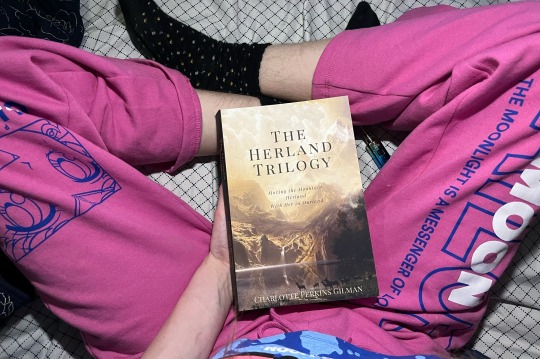
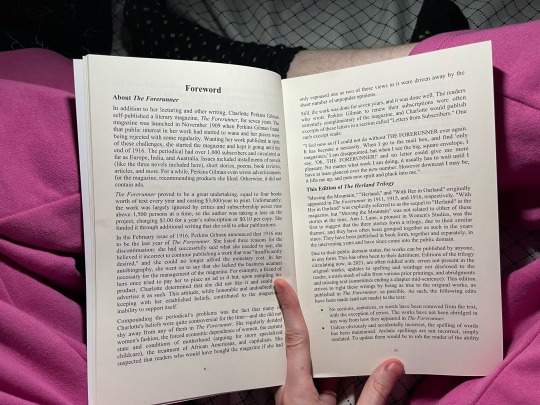
quite excited to read this edition of the Herland Trilogy! ofc there was a short biography of Charlotte Perkins Gilman before this foreward, but I thought you gyns might appreciate this bit about The Forerunner especially
(sorry for the somewhat poor quality image that you need to zoom to read + my finger lol)
#r#radfems do touch#charlotte perkins gilman#herland#the herland trilogy#the forerunner#first wave feminism#feminist literature#feminist fiction
0 notes
Text

obvi adding this to my tbr list
0 notes
Text
CRITICISM: Question Patriarchal Ideals with the All-Woman Utopian Narrative (in 6 easy steps!) from “A Retrospeculative Dive into Herland,” Maze and Miller, 2021
As my portfolio no doubt reflects, Charlotte Perkins Gilman inspires a great deal of thought and art out of me. The zine I publish here is a retrospeculative project with a fantastic author and co-conspirator I completed regarding the novel. The questioning facilitated here, in this specific post, by Vivienne Miller and Simone de Beauvoir features none of my writing, but I take sharing it as an…
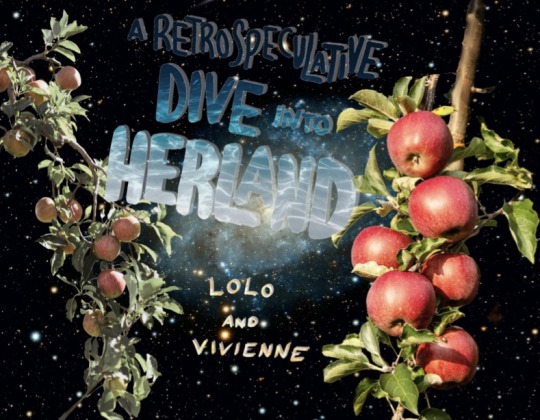
View On WordPress
#by vivienne miller#Charlotte Perkins Gilman#herland#in conversation#multimedia#vivienne miller#writing
0 notes
Audio
Song : Full Moon
Artist : Mellow Blush
Album : Herland
0 notes